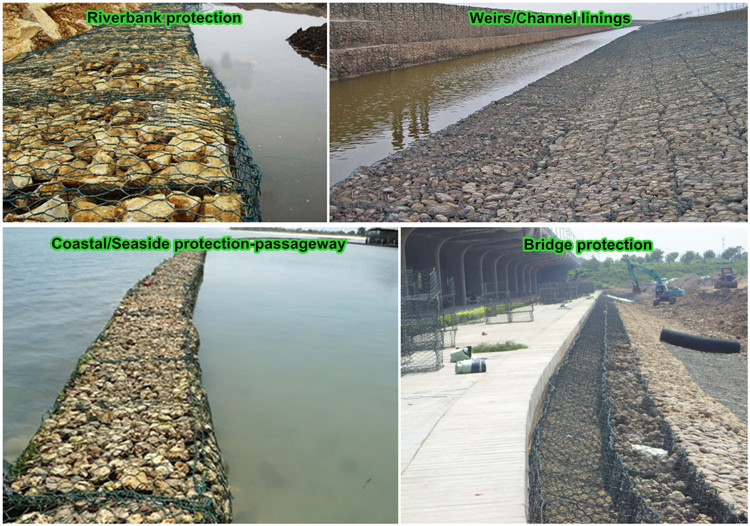Oct . 10, 2024 14:11 Back to list
gabion wire manufacturers
The Role of Gabion Wire Manufacturers in Modern Civil Engineering
In the world of civil engineering, sustainability and durability have become paramount considerations. One of the innovative solutions that reflects this trend is the use of gabions—wire mesh containers filled with rocks, concrete, or other materials. Gabion wire manufacturers play a vital role in the production and supply of these essential structures, which are increasingly utilized for a variety of applications including erosion control, landscaping, and even architectural features.
Understanding Gabions
Gabions have their roots in military engineering, where they were originally used as portable fortifications. Today, they serve as functional and aesthetic elements in civil engineering projects. Essentially, gabions are rectangular cages made from galvanized steel wire or PVC-coated wire, filled with natural stones. Their design allows them to be modular, which means they can be easily scaled up for larger projects or customized to meet specific engineering requirements.
The primary function of gabions is to provide stability and to prevent soil erosion. By using them to create retaining walls, riverbank stabilizations, and noise barriers, engineers can effectively manage the forces of nature while also enhancing the visual appeal of landscapes. The natural stone used in gabions blends seamlessly with the environment, making them an attractive option for both urban and rural settings.
The Role of Gabion Wire Manufacturers
Gabion wire manufacturers are responsible for creating the essential wire mesh that forms the structure of gabions. This wire must be strong enough to withstand environmental stresses, such as fluctuating temperatures, moisture, and potential corrosion. As such, manufacturers typically rely on high-quality materials and advanced production techniques.
Materials and Manufacturing Processes
The most common material used for gabion wire is galvanized steel, which is coated with a layer of zinc to protect it from rusting. Recent innovations have introduced PVC coatings that provide enhanced weather resistance and increased longevity. During the manufacturing process, the wire is woven into meshes of varying sizes and strengths, depending on the specifications needed for different projects.
Manufacturers often adhere to stringent industry standards to ensure that their products are reliable and durable. This commitment to quality is crucial, as the performance of gabions depends significantly on the integrity of their wire structure. By employing skilled labor and utilizing advanced machinery, gabion wire manufacturers can ensure that each mesh is produced to exacting standards.
gabion wire manufacturers

Applications of Gabions
The versatility of gabions means that they can be employed in a broad range of applications. In civil engineering, they are commonly used for
1. Erosion control Gabions can stabilize slopes and riverbanks, protecting against water flow and sediment displacement. 2. Retaining walls Their interlocking structure allows for the construction of strong retaining walls that can support significant loads and are resistant to shifting soil.
3. Noise barriers When filled with dense materials, gabions can effectively dampen urban noise pollution, making them a popular choice in residential areas near highways.
4. Landscaping Aesthetic gabion walls or benches can create visually appealing outdoor spaces while providing functional uses in gardens and parks.
5. Architectural features Innovative architects are incorporating gabions into modern designs, utilizing their adaptability and environmental harmony.
The Future of Gabion Wire Manufacturing
As the demand for sustainable construction practices grows, so too does the potential for gabion technology. Manufacturers are already exploring eco-friendly materials and sustainable production methods. Furthermore, as urbanization increases and climate change continues to affect natural landscapes, the need for effective erosion control and stabilization solutions becomes ever more critical.
Gabion wire manufacturers are poised to play a significant part in this future, providing essential materials that enhance civil engineering projects while promoting sustainability. As the industry evolves, their focus on quality, innovation, and environmental responsibility will not only meet the demands of today’s infrastructure but also contribute to a more sustainable built environment for generations to come.
In conclusion, gabion wire manufacturers are essential players in the world of civil engineering. Their products not only address practical engineering needs but also enhance landscapes, contributing to both functionality and beauty in urban planning. With ongoing advancements in materials and techniques, the importance of gabions is set to grow, reaffirming their place as versatile tools in modern construction.
-
Hop Dipped Galvanized/PVC Coated Temporary Fence - Anping County Xingzhi Metal Wiremesh Products Co., Ltd.|Temporary Fencing Solutions, Durable Security Products
NewsJul.30,2025
-
Hop Dipped Galvanized/PVC Coated Temporary Fence-Anping Xingzhi|Durability&Cost-Effective
NewsJul.30,2025
-
Hop-Dipped Galvanized PVC Fence - Anping Xingzhi | Durable, Quick Deployment
NewsJul.30,2025
-
Hop Dipped Galvanized/PVC Coated Temporary Fence - Anping County Xingzhi|Temporary Fencing, Durable Security, Customization
NewsJul.30,2025
-
Hop Dipped Galvanized PVC Coated Temporary Fences - Anping County Xingzhi|Durable Corrosion Resistance, Quick Installation
NewsJul.30,2025
-
Hop Dipped Galvanized / PVC Coated Temporary Fence - Anping County Xingzhi Metal Wiremesh Products Co., Ltd|Durable Temporary Fencing&Versatile Applications
NewsJul.30,2025



